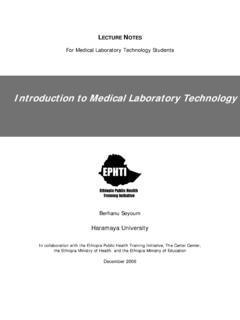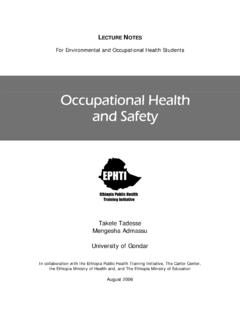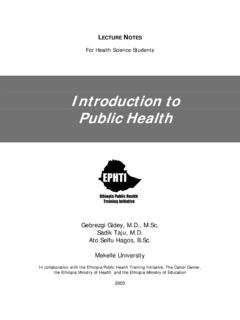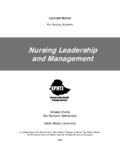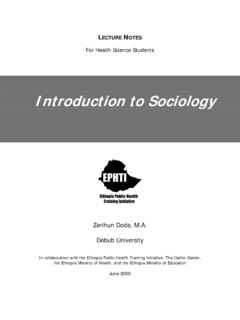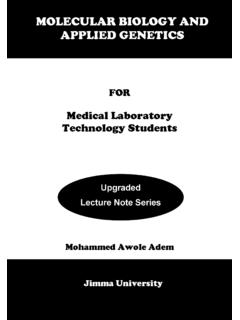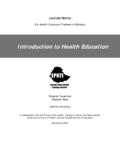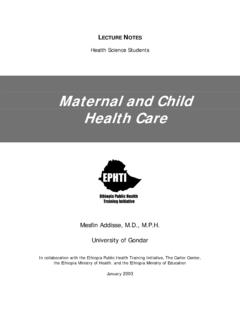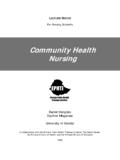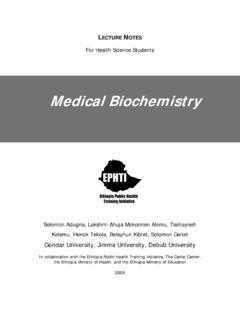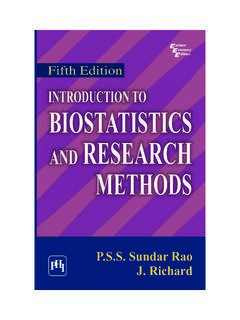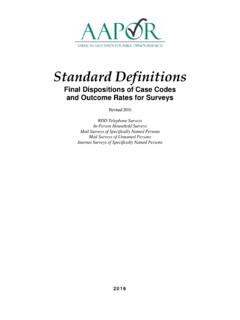Transcription of research method fm - Carter Center
1 LECTURE NOTES For Health Science Students research Methodology Getu Degu Tegbar Yigzaw University of Gondar In collaboration with the Ethiopia Public Health Training Initiative, The Carter Center , the Ethiopia Ministry of Health, and the Ethiopia Ministry of Education 2006 Funded under USAID Cooperative Agreement No. 663-A-00-00-0358-00. Produced in collaboration with the Ethiopia Public Health Training Initiative, The Carter Center , the Ethiopia Ministry of Health, and the Ethiopia Ministry of Education. Important Guidelines for Printing and Photocopying Limited permission is granted free of charge to print or photocopy all pages of this publication for educational, not-for-profit use by health care workers, students or faculty.
2 All copies must retain all author credits and copyright notices included in the original document. Under no circumstances is it permissible to sell or distribute on a commercial basis, or to claim authorship of, copies of material reproduced from this publication. 2006 by Getu Degu and Tegbar Yigzaw All rights reserved. Except as expressly provided above, no part of this publication may be reproduced or transmitted in any form or by any means, electronic or mechanical, including photocopying, recording, or by any information storage and retrieval system, without written permission of the author or authors.
3 This material is intended for educational use only by practicing health care workers or students and faculty in a health care field. iPREFACE This lecture note on research methodology is primarily aimed at health science students. It is also hoped to be useful for other individuals who would like to understand the basic principles and undertake health research . There is a strong belief that it will serve as a guideline for undergraduate health science students as they are required to identify the most important health problems and carry out some research work.
4 Chapter one deals with the general introduction and it is devoted to giving basic definitions of important terms and characteristics of research in general and health research in particular. Chapter two gives the guidelines useful for the identification and selection of a research topic. The questions relating to whether a research problem is adequately analyzed and whether it is clearly stated are addressed in Chapter three. Chapters four and five deal with literature review and the development of research objectives, respectively.
5 A special emphasis is given to Chapter six which is the Chapter that contains the many elements of the " methods " section of a research proposal. Chapter seven deals with the development of a Work plan and the preparation of a budget for a given study. A summary of the major components and outline of the different phases in a research process (proposal development, fieldwork and report writing) is given in Chapter eight. This Chapter presents the format that an investigator may follow when writing the final draft of his/her health research proposal.
6 It also gives the guidelines for writing a report. The last chapter is devoted to giving a brief account of the definitions of common terms applied in computer use and the application of some statistical packages. A special emphasis is given to Epi6. ii In general, this lecture note tries to cover the three major components of a research process: development of the research proposal, fieldwork (data collection) and write-up of the scientific report. General learning objectives followed by introductory sections which are specific to each chapter are placed at the beginning of most of the chapters.
7 The lecture note also includes a number of exercises for the students so that they can examine themselves whether they have understood the topic under consideration. It is assumed that this lecture note on research methodology will be given to health science students who have taken basic Epidemiology and Biostatistics courses. It is also important to note that this lecture note focuses on quantitative research . When the point of discussion refers to qualitative research , it would be clearly shown so as to avoid the confusion that may arise. A few reference materials are given at the end of the lecture note for further reading.
8 IiiACKNOWLEDGMENTS We would like to thank the College of Medicine and Health Sciences (University of Gondar) for allowing us to use the resources of the institution while writing this lecture note. We are highly indebted to the Carter Center (Ethiopian Public Health Training Initiative) without whose support this material would have not been written. In particular, we are very grateful to Ato Aklilu Mulugeta (from the Carter Center ) for his uninterrupted follow up and encouragement.
9 We would like to extend our gratitude and appreciation to Dr. Getnet Mitikie and Dr. Mesganaw Fantahun of Addis Ababa University Associate and Assistant Professors respectively for their critical reviews and valuable comments on the initial draft of these teaching materials.. iv TABLE OF CONTENTS Preface ..i Acknowledgements ..iii Table of Contents .. iv Chapter 1: Introduction to research ..1 Learning Objectives ..1 Introduction ..1 Definitions and characteristics of research .. 2 Types of research ..2 Health systems research .
10 5 Main components of any research work ..7 Exercises ..7 Chapter 2: Topic Selection ..8 Learning Objectives ..8 Introduction ..8 Problem identification ..9 Criteria for prioritizing problems for research ..10 Exercises ..13 Chapter 3: Analysis and Statement of the problem ..15 Learning Objectives ..15 Introduction ..15 Analyzing the problem ..15 Formulating the problem statement ..15 Exercises ..17 vChapter 4: Literature review ..18 Learning Objectives .. 18 Introduction ..18 Uses of literature review.
